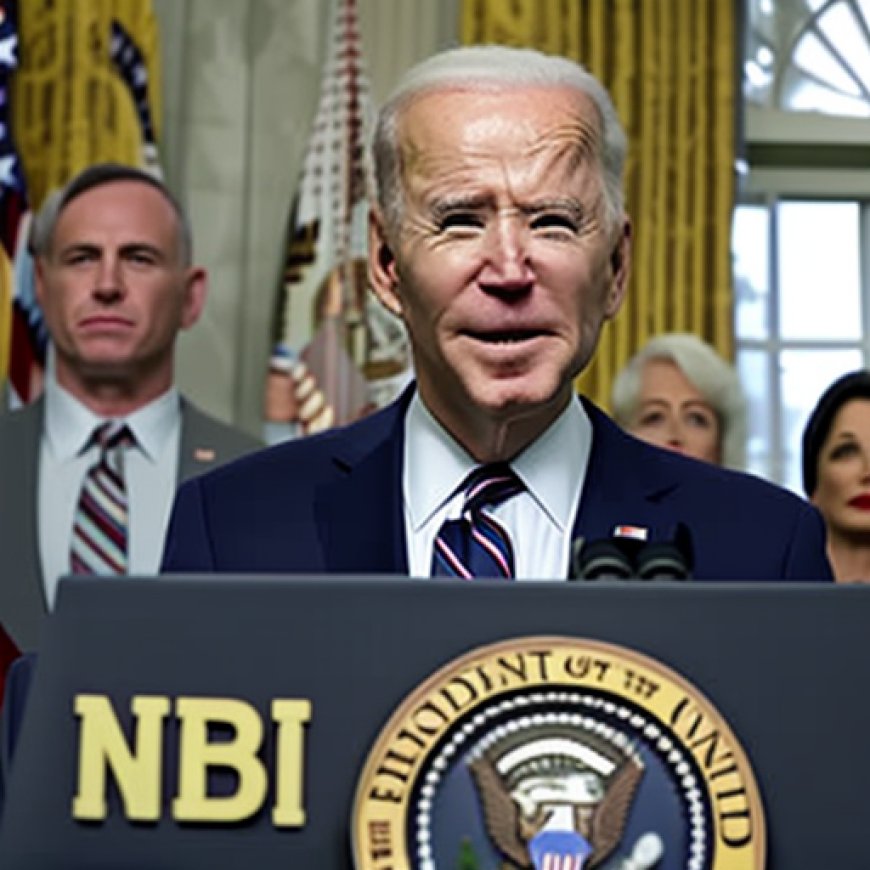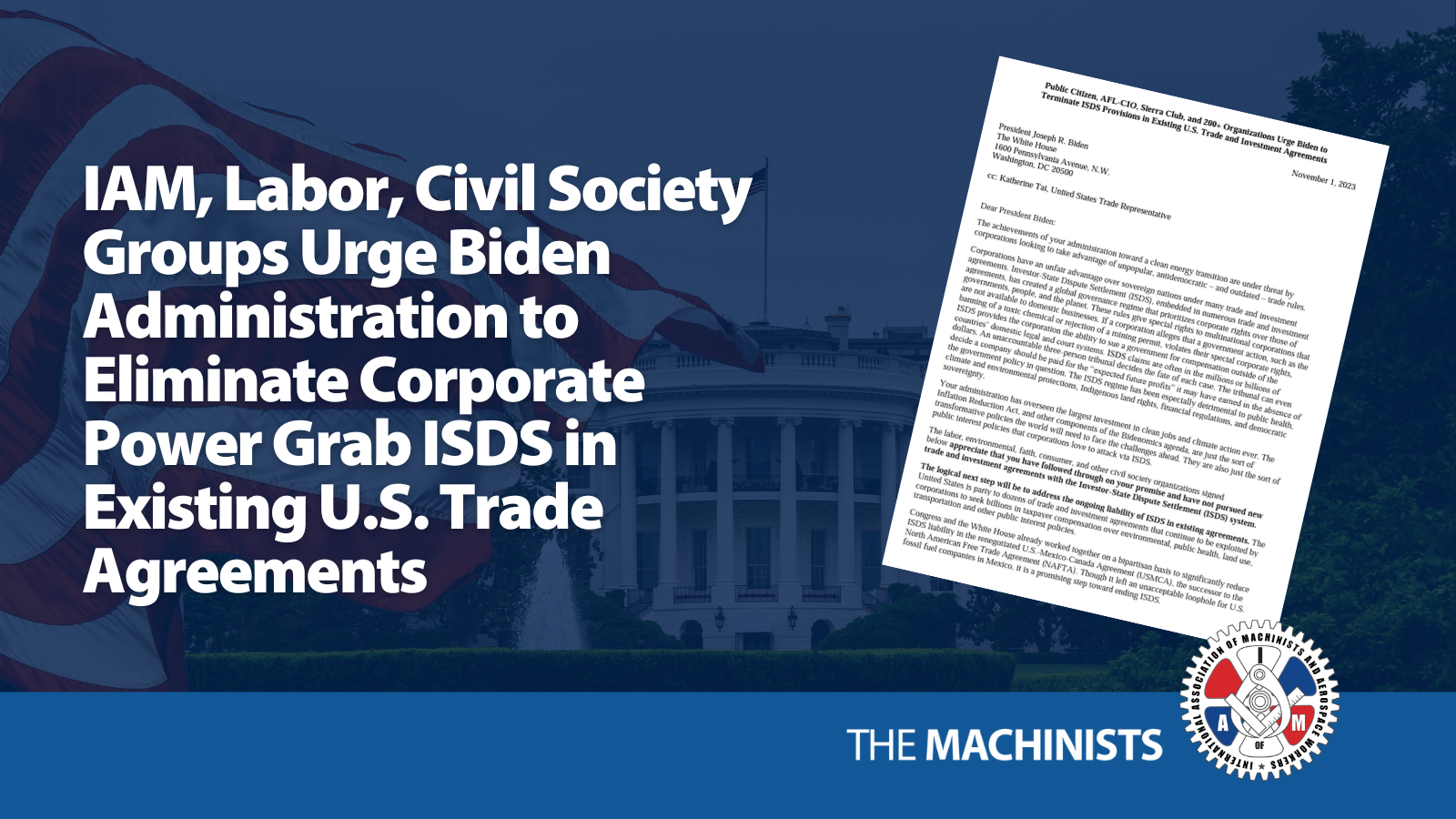IAM, Labor, Civil Society Groups Urge Biden Administration to Eliminate Corporate Power Grab ISDS in Existing U.S. Trade Agreements – IAMAW
IAM, Labor, Civil Society Groups Urge Biden Administration to ... GOIAM


The IAM and Labor Groups Call for Elimination of ISDS in Trade Agreements

The International Association of Machinists and Aerospace Workers (IAM) and over 200 organizations and labor groups have jointly sent a letter to the Biden administration, urging the elimination of the Investor-State Dispute Settlement (ISDS) in existing free trade agreements and bilateral investment treaties.
Addressing the Ongoing Liability of ISDS
The letter emphasizes the need to address the ongoing liability of ISDS in existing trade agreements, as it empowers multinational corporations to sue governments before panels of corporate lawyers, posing a threat to public interest policies.
The Impact of ISDS Mechanism
Under the ISDS mechanism, corporations have the ability to seek compensation from taxpayers for the loss of expected future profits resulting from a challenged government policy. Lawyers representing these corporations can award unlimited sums to be paid by taxpayers if they are convinced that a safety regulation, court ruling, law, or any other government action violates the investors’ rights granted by an agreement enforced by ISDS.
Call for Elimination of Rigged Trade Rules
IAM International President Robert Martinez Jr. states, “When trade and investment agreements include ISDS, it is clear that they are not designed to benefit working people, but to give special rights to consolidate, formalize, and expand corporate power.” The IAM urges the Biden administration to eliminate these rigged and anti-democratic trade rules that prioritize corporate rights over national sovereignty and working people.
IAM’s Advocacy for Fair Trade Policies
The IAM, as a strong supporter of workers’ rights, has consistently advocated for fair U.S. trade policies that prioritize the well-being of workers. This includes their efforts to reduce ISDS liability in the renegotiated U.S.-Mexico-Canada Agreement (USMCA).
Prioritizing Fundamental Human Rights
It is crucial for trade policies to prioritize and uphold fundamental human rights rather than creating incentives for multinational corporations to undermine labor, health, environmental, and other essential public policies.
Share and Follow:
SDGs, Targets, and Indicators Analysis
1. Which SDGs are addressed or connected to the issues highlighted in the article?
- SDG 8: Decent Work and Economic Growth
- SDG 16: Peace, Justice, and Strong Institutions
The article discusses the need to eliminate the Investor-State Dispute Settlement (ISDS) mechanism in existing free trade agreements and bilateral investment treaties. This issue is connected to SDG 8 as it relates to promoting decent work and economic growth. It also connects to SDG 16 as it involves ensuring peace, justice, and strong institutions by addressing the threat to public interest policies posed by ISDS.
2. What specific targets under those SDGs can be identified based on the article’s content?
- Target 8.8: Protect labor rights and promote safe and secure working environments for all workers
- Target 16.3: Promote the rule of law at the national and international levels and ensure equal access to justice for all
The article emphasizes the need to prioritize workers’ well-being and fair trade policies. This aligns with Target 8.8 of SDG 8, which aims to protect labor rights and promote safe working environments. Additionally, the call to eliminate ISDS highlights the importance of promoting the rule of law and equal access to justice, which corresponds to Target 16.3 of SDG 16.
3. Are there any indicators mentioned or implied in the article that can be used to measure progress towards the identified targets?
Yes, there are indicators mentioned in the article that can be used to measure progress towards the identified targets. These indicators include:
- Indicator for Target 8.8: Number of labor rights violations reported and resolved
- Indicator for Target 16.3: Number of free trade agreements or bilateral investment treaties that eliminate or reform the ISDS mechanism
The article highlights the need to address labor rights violations and the negative impact of the ISDS mechanism. The number of reported and resolved labor rights violations can serve as an indicator for progress towards Target 8.8. Similarly, the number of free trade agreements or bilateral investment treaties that eliminate or reform the ISDS mechanism can indicate progress towards Target 16.3.
4. Table: SDGs, Targets, and Indicators
| SDGs | Targets | Indicators |
|---|---|---|
| SDG 8: Decent Work and Economic Growth | Target 8.8: Protect labor rights and promote safe and secure working environments for all workers | Number of labor rights violations reported and resolved |
| SDG 16: Peace, Justice, and Strong Institutions | Target 16.3: Promote the rule of law at the national and international levels and ensure equal access to justice for all | Number of free trade agreements or bilateral investment treaties that eliminate or reform the ISDS mechanism |
Behold! This splendid article springs forth from the wellspring of knowledge, shaped by a wondrous proprietary AI technology that delved into a vast ocean of data, illuminating the path towards the Sustainable Development Goals. Remember that all rights are reserved by SDG Investors LLC, empowering us to champion progress together.
Source: goiam.org

Join us, as fellow seekers of change, on a transformative journey at https://sdgtalks.ai/welcome, where you can become a member and actively contribute to shaping a brighter future.







